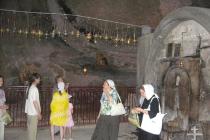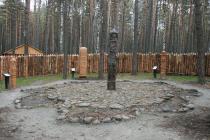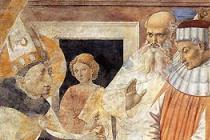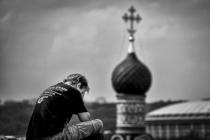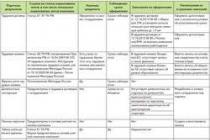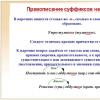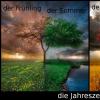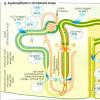"Protestant" Bible
H We often hear the question: “Is it possible to read the Bible that you took from a Protestant? They say there are some books missing?”
Over the course of several years, generous overseas preachers provided the Holy Scriptures to almost all Russians who wanted them. Many people came to Protestant meetings solely for the gift of the Bible. It must be admitted that in this respect the Lord turned evil into good - it would have been extremely difficult for the Moscow Patriarchate to publish so many Bibles on its own.
But can an Orthodox person read them without harm to the soul? The point here is not who he took the Bible from, but what is printed in it. The overwhelming majority of “Protestant” Bibles in Russian are printed from the Synodal edition of the 19th century, as indicated by the inscription on the back of the title page. If there is such an inscription there, you can read it without embarrassment, since the texts of the sacred books do not contain anything non-Orthodox.
Another thing is “free” translations of the Bible or individual biblical books (for example, “Word of Life”), as well as the Bible with commentaries. Naturally, Protestants comment on the Word of God from their heretical positions.
Another feature of foreign editions of the Bible is the absence of eleven Old Testament books: Tobit, Judith, Wisdom of Solomon, Wisdom of Jesus son of Sirach, the prophet Baruch, the Epistle of Jeremiah, the second and third books of Ezra and the three books of Maccabees. They are not included in the modern Hebrew translation of the Holy Scriptures and are called non-canonical, that is, not included in the canon (“model”, “rule” in Greek). The more reliable Greek translation of the Bible contains these books.
The Slavic translation of the Holy Scriptures was carried out from the Greek text, therefore non-canonical books were included in it and, according to tradition, are present in domestic editions of the Bible. According to the Orthodox catechism of St. Philaret of Moscow, the Church offers its children non-canonical books as pious reading, but does not extend to them the concept of “divine inspiration” inherent in canonical books.
Non-canonical books are not used during worship, with the exception of a few readings from the Book of Wisdom of Solomon.
From the book Introduction to the Old Testament. Book 1 author Yungerov Pavel Alexandrovich From the book Essay on Orthodox Dogmatic Theology. Part II author Malinovsky Nikolay Platonovich§ 165. Protestant doctrine? the universal priesthood of Christians. Protestant Ordination. Protestant religions - Lutheranism and Reformation - reject the priesthood as a sacrament. The general church teaching on hierarchy and priesthood as a sacrament,
From the book Christ Our High Priest author White ElenaThe Bible and the Bible alone William Miller possessed a tremendous intellect, developed through his diligent study and reflection, and having merged with the Source of Wisdom, he was also endowed with heavenly wisdom. He was an impeccably honest man, fully deserving of respect and
From the book Theological Thought of the Reformation author McGrath AlistairThe Protestant Work Ethic To understand the significance of the work ethic that emerged during the Reformation, it is necessary to understand the persistent opposition with which the early Christian tradition, represented by monastic writers, viewed work. For Eusebius of Caesarea
From the book Handbook on Theology. SDA Bible Commentary Volume 12 author Seventh Day Adventist ChurchA. The Bible and the Bible Alone The fundamental principle that Scripture sets forth about itself is that the Bible alone (sola scriptura) is the final standard of truth. The classic text that reflects this basic premise is Isa. 8:20: “Contact
From the book The Jewish World author Telushkin Joseph From the book Bibliological Dictionary author Men AlexanderBIBLE (term). The word B. comes from the Greek. t¦ bibl...a - books. Corresponding Heb. term as applied to the Holy. Scripture is first encountered in the Old Testament. time: “I, Daniel, understood from the books (Heb. sfar?m) the number of years about which the word of the Lord came to Jeremiah” (Dan 9:2). In Christ.
From the book History of the Greek-Eastern Church under the rule of the Turks author Lebedev Alexey PetrovichLIBERAL PROTESTANT SCHOOL OF EXEGESIS direction in biblical studies of the 19th - early 20th centuries. Organically part of liberal theology, which tried to minimize the dogmatic aspect of Christianity. The main provisions of the school: 1) the highest Reality cannot be known
From the book The Religion of the Cross and the Religion of the Crescent: Christianity and Islam author Maksimov Yuri ValerievichPROTESTANT EXEGETICS interpretation of the Bible and methods of *hermeneutics that have developed in various Protestant denominations. P.e. developed predominantly where these faiths occupied a dominant position (see article on the Anglo-American, German, Dutch,
From the book Theological Encyclopedic Dictionary by Elwell WalterProtestant unrest in the Greek Church of the 17th century. IThe increase in travel of Greek clergy abroad, mainly to Protestant countries, at the end of the 16th and beginning of the 17th century, the purpose of these travels; ? - information about this kind of travel at the end of the 16th century; Kirill's journey
From the book History of Secret Societies, Unions and Orders author Schuster GeorgThe Protestant idea of universal equality and the Orthodox doctrine of hierarchy It should be remembered that the now popular idea of universal equality flourished on Protestant soil. This idea in the form in which it now exists is deeply alien to Orthodoxy. I loved Jacob
From the book History of Religions. Volume 1 author Kryvelev Joseph AronovichReformation, Protestant. The religious revival movement that swept Europe in the 16th century. and prepared by earlier Reformed ideas - the Waldensians in the Alps, Wycliffe and Dollards in England and the Hussites in Bohemia. This movement is inseparable from its
From the book Protestant Ethics and the Spirit of Capitalism by Weber MaxScholasticism, Protestant. A method of thinking developed by early Protestantism that gained influence in the 17th century. and became a widely accepted way of developing systematic Protestant theology. Although the main figures of the Protestant Reformation
Over the course of several years, generous overseas preachers provided the Holy Scriptures to almost all Russians who wanted them. Many people came to Protestant meetings solely for the gift of the Bible. It must be admitted that in this respect the Lord turned evil into good - it would have been extremely difficult for the Moscow Patriarchate to publish so many Bibles on its own. But can an Orthodox person read them without harm to the soul? The point here is not who he took the Bible from, but what is printed in it. The overwhelming majority of “Protestant” Bibles in Russian are printed from the Synodal edition of the 19th century, as indicated by the inscription on the back of the title page. If there is such an inscription there, you can read it without embarrassment, since the texts of the sacred books do not contain anything non-Orthodox. Another thing is “free” translations of the Bible or individual biblical books (for example, “Word of Life”), as well as the Bible with commentaries. Naturally, Protestants comment on the Word of God from their heretical positions.
Another feature of foreign editions of the Bible is the absence of eleven Old Testament books: Tobit, Judith, Wisdom of Solomon, Wisdom of Jesus son of Sirach, the prophet Baruch, the Epistle of Jeremiah, the second and third books of Ezra and the three books of Maccabees. They are not included in the modern Hebrew translation of the Holy Scriptures and are called non-canonical, that is, not included in the canon (“model”, “rule” in Greek). The more reliable Greek translation of the Bible contains these books.
The Slavic translation of the Holy Scriptures was carried out from the Greek text, therefore non-canonical books were included in it and, according to tradition, are present in domestic editions of the Bible. According to the Orthodox catechism of St. Philaret of Moscow, the Church offers its children non-canonical books as pious reading, but does not extend to them the concept of “divine inspiration” inherent in canonical books.
Non-canonical books are not used during worship, with the exception of a few readings from the Book of Wisdom of Solomon. So you can read the Bible taken from Protestants for spiritual benefit and edification. Just don’t, as Deacon Andrei Kuraev noted, sell your soul for this gift - accept the Protestant faith.
The Catholic Bible contains the books of Tabitha, Judith, Wisdom of Solomon, Ecclesiastes, Baruch, First and Second Maccabees, plus some additions to the books of Esther and Daniel. These additional writings are usually called the Apocrypha. They are scattered among the 39 books of the Old Testament.
+ Apocrypha means "hidden or counterfeit" (Webster's Encyclopedic Dictionary). This term refers to writings whose authenticity is in doubt or whose source is generally unknown. There are many similar works rejected by both Catholics and Protestants. Those accepted in Catholic Bibles are usually called the "Old Testament Apocrypha."
These books were written between 200 BC. and 100 AD Some, such as First and Second Maccabees and Ecclesiastes, are of some interest from the point of view of their historical or ethical content; while the rest is pure fiction and therefore has no value. Their absence from the Protestant Bible is not due to the degree of their suitability, but due to doubt as to their divine inspiration.
These apocryphal books are rejected by the Protestant Bible for the following reasons:
- There is no evidence that they were ever accepted by the Jews into the Old Testament canon. This is especially important since the Jews “were entrusted with the revelations of God” (Rom. 3:2).
- Fili and Yosef, both former Jews of the 1st century CE. and those who left many works do not quote a single Apocrypha. The latter indicates that the canon of sacred books includes 22 books (I group some as one whole), which corresponds to our 39 books. It is also accepted by many authorities in this field that the Jewish council at Jamnia (90 and 118 AD) confirmed the Jewish canon as we now know it.
- Jesus and his apostles quoted freely from almost every book of the Old Testament, but not once did they mention any of the apocryphal books. They called the Old Testament books as “Scripture” (John 10:35; 19:36; 2 Pet. 1:20), “Writings” (Matthew 22:29; Acts 18:24), “Holy Scriptures” (Rom. 1:2), "The Sacred Records" (2 Tim. 3:15), "The Law" (John 10:34; 12:34; 15:25; 1 Cor. 14:21) and "The Law and the Prophets" ( Matthew 5:17; 7:12; 22:40; Luke 16:16; 24:44; Acts 13:15; 28:23). They never called Apocrypha in such terms.
- For the first four centuries, churches widely rejected these books as non-canonical. Famous authors of that period - Justin Martyr, Origen, Tertullian, Hilary, Jerome - did not recognize these Apocrypha. Jerome, whose writings are the basis for the Roman Catholic Church, was particularly vehement in his opposition to them. They began to permeate the community of believers from the fifth century AD until they were officially established as authoritative writings at the Council of Trent in 1546.
- Perhaps the strongest argument against these books will be the books themselves. They do not themselves proclaim that they are the Word of God or that they come from the pen of the prophets. They are full of inaccuracies, contradictions and all kinds of legends. They cannot in any way be considered divinely inspired. Therefore, they cannot be considered to have come from God and therefore they have no place among the books of the Bible.
PROTESTANTS: WHO ARE THEY?
Protestants are Christians who belong to one of several independent Christian churches.
Protestants, Catholics and Orthodox Christians share the fundamental principles of Christianity. For example, they all accept the Nicene Creed, adopted by the first Council of the Church in 325. They all believe in the death, burial and resurrection of Jesus Christ, in His divine essence and future coming. All three schools accept the Bible as the Word of God and agree that repentance and faith are necessary to have eternal life and escape hell. Together, these three groups make up the largest religion in the world - Christianity. According to Operation Peace, there are approximately 720 million Protestants, 943 million Catholics, and 211 million Orthodox Christians worldwide (Operation Peace, 2001).
However, the views of Catholics, Orthodox and Protestants on some issues differ. Protestants believe that the Bible is the most authoritative source of teaching for Christians. Orthodox and Catholics generally believe that church traditions have greater weight and believe that the Bible can only be understood correctly in the context of church tradition.
However, despite their differences, all Christians agree with Christ's prayer. John 17:21: “that all may be one...”
HISTORY OF PROTESTANT CHURCHES
One of the first Protestant reformers was a priest, professor of theology Jan Hus, a Slav who lived in the territory of modern Czech Republic and became a martyr for the faith in 1415. Hus taught that Scripture is more important than tradition. The Protestant Reformation spread throughout Europe in 1517 when another Catholic priest and theology professor named Martin Luther called for renewal of the church. He said that when the Bible conflicts with church traditions, the Bible must be obeyed. Luther said that the Church was doing wrong by selling the opportunity to go to heaven for money. He also believed that salvation came through faith in Christ and not through trying to “earn” eternal life through good works. The Protestant Reformation is now spreading throughout the world. As a result, churches such as Lutheran, Anglican, Dutch Reformed, and later Baptist, Pentecostal and others were formed. (Note: Neither Catholics, Orthodox, nor Protestants recognize Jehovah's Witnesses and Mormons as Christian churches.)
Protestants first came to Russia during the time of Ivan the Terrible and by 1590 they were already in Siberia, in Tobolsk (“Icon and Axe,” p. 98).
Today many Protestants would like to return to the purity of the first century Church. Most of these Protestants are called evangelicals because they believe that Christians must fulfill Christ's commission: “Go therefore and teach all nations...” Matt. 28:19.
HOW DO PROTESTANTS INTERPRET THE BIBLE?
Protestants believe that every Christian is responsible for his own spiritual life and can interpret the Bible himself with God's help. The Bible says: “Nevertheless, the anointing which you received from Him remains in you, and you do not need anyone to teach you; …this anointing teaches you all things” 1 John 2:27.
Jesus said: “When He, the Spirit of truth, has come, He will guide you into all truth” John 16:13
Errors in interpretation occur due to ignorance of the Bible: “You are mistaken, not knowing the Scriptures or the power of God” Matthew 22:29.
The Bible encourages personal study of Scripture: “The people here were more thoughtful than those in Thessalonica: they received the word with all diligence, searching the Scriptures daily to see if these things were true” Acts 17:11.
WHAT DO PROTESTANTS THINK ABOUT CHURCH TRADITIONS?
Protestants have nothing against church traditions, except when these traditions contradict Scripture. They base this primarily on Jesus' remarks in Mark 7:8: “For you have abandoned the commandment of God and hold to the tradition of men...” and in Matthew 15:3, 6: “...Why do you transgress the commandment of God for the sake of your tradition? …Thus you have made the commandment of God null and void by your tradition.”
WHY DO MOST PROTESTANTS NOT BAPTIZE INFANTS?
They believe the Bible's statement that baptism should follow the repentance of Acts. 2:3.
Most Protestants believe that children automatically go to heaven after death. Jesus said: “Let the little children come and do not hinder them from coming to Me, for of such is the Kingdom of Heaven” Matt. 19:14. Protestants say that the Bible does not record a single instance of infant baptism. Even Jesus waited until he was 30 years old to be baptized.
WHY ARE PROTESTANTS BAPTIZED IN WATER WHEN THEY ARE ADULTS?
Many Protestants believe that baptism without repentance is meaningless, and since an infant cannot repent due to his ignorance of good and evil, adults are often recommended to be baptized again after they have repented. Matt. 3:6, Mark. 1:5, Luke. 3:7
WHY ARE THERE NO ICONS IN PROTESTANT CHURCHES AND HOUSES?
Protestants believe that the Ten Commandments (Exodus 20:4) prohibit the use of images for worship: “You shall not make for yourself any graven image or any likeness of anything that is in heaven above, or that is in the earth beneath, or that is in the water under the earth.” In Deuteronomy 4:15-16 the Lord says: “Keep it firmly in your souls that you did not see any image on the day that the Lord spoke to you on Mount Horith out of the midst of the fire, lest you become corrupt and make for yourself graven images, images of any idol...” Therefore, Protestants do not use images for worship for fear that some people may worship these images instead of God.
WHY DO NOT PROTESTANTS PRAY TO SAINTS OR THE VIRGIN MARY?
Protestants prefer to follow the instructions of Jesus, where He taught us to pray saying: “Pray like this: Our Father who art in heaven!” Mtf. 6: 9. Protestants say that there are no examples in Scripture of anyone praying to Mary or the saints. They believe that the Bible forbids praying to people who have died, even to Christians in heaven. They base this on Deuteronomy 18:10-12, which says: “The one who inquires of the dead should not be with you.”“Inquirer of the dead” means one who communicates with the dead (from the Hebrew “darash” - to consult, find out, seek or pray to the dead). God condemned Saul for coming into contact with Saint Samuel after his death 1 Chron. 10:13-14.
“For there is one God, and one mediator between God and men, the man Christ Jesus” 1 Timothy 2:5
DO PROTESTANTS ACCEPT THE SEVEN ECUMENICAL COUNTERS?
Protestants accept most of the decisions of historical church councils, but do not consider them infallible. This attitude is based on the fact that some decrees, in particular those adopted at the last two Councils of Nicaea, contradict each other on the issue of icons. At the first of them, held in 754, the use of icons was prohibited, while at the second, in 787, it was decided that icons should be used. Protestants accept the decisions of the Councils only when they correspond to the teachings of the Bible.
WHAT DO PROTESTANTS THINK ABOUT THE CHURCH FATHERS?
Protestants respect and value the teachings of the Church Fathers (church leaders who lived after the apostles) when these teachings are in agreement with Scripture. This is based on the fact that often the Church Fathers do not agree with each other.
WHAT IS THE OPINION OF PROTESTANTS ABOUT THE RECENTS OF THE SAINTS?
Protestants do not believe that the relics of saints contain any special power because the Bible does not teach this. Protestants believe that the incident with Elisha's bones, which resurrected the dead (2 Kings 13:21), was nothing more than the fulfillment of God's promise to give Elisha double the spirit that was on Elijah (2 Kings 2:9). The miracle that occurred after Elisha's death was just twice the number of miracles performed by Elijah. Protestants believe that there is no other indication in the Bible that Christians should honor the bodies of the dead, so they do not honor them.
WHY DON'T MOST PROTESTANT MINISTERS WEAR CASUTANES AND WHY ARE THEY NOT CALLED "FATHER"?
Protestant ministers do not wear cassocks because neither Jesus nor the apostles wore any special clothing; there is also no indication in this regard in the New Testament.
They are not usually called "father" because Jesus said in Matthew 23:9: “And don’t call anyone on earth your father...” which, according to Protestants, means that we should not claim anyone as our spiritual master.
WHY ARE THERE NO ICONOSTASES IN PROTESTANT AND CATHOLIC CHURCHES?
Protestants and Catholics believe that the iconostasis symbolizes the veil separating people from the Holy of Holies in the Jerusalem Temple. They believe that when God tore it in two at the death of Jesus Matt. 27:51, then He thereby said that we are no longer separated from Him due to the blood He shed so that we would be forgiven if we repented and believed in Christ for our salvation.
HOW CAN PROTESTANTS HOLD WORSHIP IN PLACES SUCH AS CINEMA THEATERS, BECAUSE THEY ARE NOT HOLY OR SANCTIFYED?
Jesus said in Matthew 18:20: “For where two or three are gathered together in My name, there am I in the midst of them.” Protestants believe that worship is sanctified not by the place where the service is held, not by the building, but by the presence of Christ among the believers. The Bible also says that Christians are the temple of God, not buildings: “ Do you not know that you are the temple of God, and the Spirit of God dwells in you?” 1 Cor. 3:16. The Bible shows that the early Christians held services in many different places: in the school (Acts 19:9), in the Jewish synagogues (Acts 18:4, 26; 19:8), in the Jewish temple (Acts 3:1), and in private homes (Acts 2:46; 5:42; 18:7; Philim. 1:2: 18:7: Col. 4:15; Rom. 16:5 and 1 Cor. 16:19) . Evangelism services, according to the Bible, took place near the river (Acts 16:13), in the street crowd (Acts 2:14), and in the public square (Acts 17:17). There is no evidence in the Bible that the first Christians held services in a church building.
DO PROTESTANTS BELIEVE THAT YOU CAN GO TO HEAVEN AFTER PURIFICATION IN PURGATORY?
Protestants believe that there is both heaven and hell, but they do not believe in purgatory. The Bible says: “For by one offering he (Christ) has made perfect forever those who are sanctified” Hebrews 10:14. Since it is indicated that only one sacrificial offering, the suffering of Christ, makes us perfect, then other sacrifices are not required. The Bible also says: “But where there is forgiveness of sins, there is no need for an offering for them” Hebrews 10:18. In other words, there is no need to suffer in purgatory if we are forgiven. Protestants believe that 1 Corinthians 3:9-15 refers to testing the works of believers on the day of judgment, not purgatory.
DO PROTESTANTS PRAY FOR THE DEAD?
In describing heaven and hell in Luke 16:26, Christ speaks only of heaven and hell, not purgatory. Further, He says that it is impossible to pass from hell to heaven: “and on top of all this, a great abyss has been established between us and you, so that those who want to cross from here to you cannot cross, nor can they cross from there to us.”
Protestants believe that there is no evidence in the Bible for the existence of a place between heaven and hell where people could atone for their sins. Also, there are no examples of prayer for the dead in the Bible. Protestants believe that prayer for the dead cannot help them.
HOW CAN PROTESTANT MINISTERS MINISTER WITHOUT APOSTOLIC SUCCESSION?
Some Christian denominations adhere to the theory of apostolic succession. They believe that only those who can trace their ordination back to the original 12 apostles can serve as priests or ministers.
According to most Protestants, Scripture does not support this theory. It is God's calling of a person to ministry that qualifies him as a priest or minister, not his appointment by human authority. Hebrews 5:4 says, “And no one of his own accord accepts this honor, but he who is called of God, even as Aaron.” For example, the call of the Apostle Paul to ministry came from God, and not from people. In Galatians 1:1, he says: “Paul is an Apostle, chosen not by men or through man, but by Jesus Christ and God the Father.”
When God called Paul to preach the gospel, Paul said: “... I did not then consult with flesh and blood, and did not go to Jerusalem to those who preceded me.” Gal. 1:15.
WHAT BIBLE DO PROTESTANTS READ?
The Protestant and Jewish Scriptures do not include the so-called books of the Apocrypha, which are included in the Old Testament of the Catholic and Orthodox Bibles. Protestants do not include the Apocrypha in the Bible because Jesus never referred to them and they are not quoted in the New Testament. This distinguishes them from the rest of the books of the Old Testament.
Secondly, the Bible states that the Jews were commissioned to preserve the Jewish Scriptures and they did not accept and still do not consider these books to be part of the Old Testament. That's what Rome is. 3:2 speaks of the Jews: “... they have been entrusted with the word of God.”
Protestants also believe that these additional books contradict the Bible. For example, in several places the apocrypha states that one can buy eternal life by donating money to the church (2 Maccabees 12:43-45, Tobit 4:8-11, Tobit 12:9, Tobit 14:10-11, Sirach 3: thirty). However, the Bible says that eternal life is a gift of God that cannot be purchased with money:
“But Peter said to him, “Let your money perish with you, because you thought that you could receive the gift of God with money” Acts. 8:20.
“For the wages of sin is death, but the gift of God is eternal life in Christ Jesus our Lord” Rom. 6:23.
The Apostle Peter, when asked a similar question (Acts 2:37-38), answered this way: “ Repent and be baptized each of you in the name of Jesus Christ for the forgiveness of sins.” Therefore, we simply need to repent of our sins and be baptized.
Jesus said in Luke 13:3 that “unless you repent, you will all likewise perish.” Repentance means turning away from your sinful lifestyle, deciding to follow Christ and confirming this decision by water baptism, trying to live a life pleasing to God. Repentance itself is a gift from God that must be accepted without delay. Isaiah 55:6 says : “Seek the Lord when He can be found; call upon Him when He is near.” Jesus said: “Repent, for the kingdom of heaven is at hand.” Mtf. 4:17. Will you answer His call? Will you accept Him as Lord of your life? If yes, then pray this prayer:
“Heavenly Father! I admit that I am a sinner. I ask forgiveness for my sins. Please forgive me. Change my heart and make me the person You want me to be. I turn from my sins and choose to follow Christ as the Lord of my life. I believe He died on the cross for my sins and rose again on the third day. Thank you for forgiving me! Lead me and guide me throughout my life until I stand before You in heaven, forgiven and justified by the blood of Jesus Christ shed for me. In the name of Jesus and in the name of the Father, Son and Holy Spirit. Amen!"
If you prayed this prayer and did it sincerely, then your sins are forgiven! (1 John 5:13). Continue to walk with God in daily repentance and for this you need help and communication with other Christians. Read the Bible, pray daily and be with Christ. Acts 2:41-42 says: “So those who gladly accepted his word were baptized, and about three thousand souls were added that day. And they continued constantly in the teaching of the Apostles, in fellowship and in the breaking of bread and in prayers.”
How did the separations happen?
The Orthodox Church has preserved intact the truth that the Lord Jesus Christ revealed to the apostles. But the Lord Himself warned His disciples that from among those who would be with them there would appear people who would want to distort the truth and muddy it with their own inventions: Beware of false prophets, who come to you in sheep's clothing, but inwardly they are ravenous wolves.(Matt. 7:15).
And the apostles also warned about this. For example, the Apostle Peter wrote: you will have false teachers who will introduce destructive heresies and, denying the Lord who bought them, will bring upon themselves quick destruction. And many will follow their depravity, and through them the path of truth will be reproached... Having left the straight path, they have gone astray... the darkness of eternal darkness is prepared for them(2 Pet. 2, 1-2, 15, 17).
Heresy is understood as a lie that a person follows consciously. The path that Jesus Christ opened requires dedication and effort from a person so that it becomes clear whether he really entered this path with firm intention and love for the truth. It is not enough to just call yourself a Christian; you must prove with your deeds, words and thoughts, with your whole life, that you are a Christian. He who loves the truth, for its sake, is ready to renounce all lies in his thoughts and his life, so that the truth may enter into him, cleanse and sanctify him.
But not everyone embarks on this path with pure intentions. And their subsequent life in the Church reveals their bad mood. And those who love themselves more than God fall away from the Church.
There is a sin of action - when a person violates the commandments of God by deed, and there is a sin of mind - when a person prefers his lie to the Divine truth. The second is called heresy. And among those who called themselves Christians at different times, there were both people devoted to the sin of action, and people devoted to the sin of the mind. Both people resist God. Either person, if he has made a firm choice in favor of sin, cannot remain in the Church and falls away from it. Thus, throughout history, everyone who chose sin left the Orthodox Church.

The Apostle John spoke about them: They left us, but they were not ours: for if they were ours, they would have remained with us; but they came out, and through this it was revealed that not all of us(1 Jn. 2 , 19).
Their fate is unenviable, because the Scripture says that those who surrender heresies... will not inherit the Kingdom of God(Gal. 5 , 20-21).
Precisely because a person is free, he can always make a choice and use freedom either for good, by choosing the path to God, or for evil, by choosing sin. This is the reason that false teachers arose and those who believed them more than Christ and His Church arose.
When heretics appeared, introducing lies, the holy fathers of the Orthodox Church began to explain to them their errors and called on them to abandon fiction and turn to the truth. Some, convinced by their words, were corrected, but not all. And about those who persisted in lies, the Church pronounced its judgment, testifying that they were not true followers of Christ and members of the community of the faithful founded by Him. This is how the apostolic council was fulfilled: After the first and second admonition, turn away from the heretic, knowing that such a one has become corrupted and sins, being self-condemned(Tit. 3 , 10-11).
There have been many such people in history. The most widespread and numerous of the communities they founded that have survived to this day are the Monophysite Eastern Churches (they arose in the 5th century), the Roman Catholic Church (which fell away from the Ecumenical Orthodox Church in the 11th century) and Churches that call themselves Protestant. Today we will look at how the path of Protestantism differs from the path of the Orthodox Church.
Protestantism
If any branch breaks off from a tree, then, having lost contact with the vital juices, it will inevitably begin to dry out, lose its leaves, become fragile and easily break at the first onslaught.
The same is evident in the life of all communities that separated from the Orthodox Church. Just as a broken branch cannot retain its leaves, so those who are separated from true church unity can no longer maintain their inner unity. This happens because, having left God’s family, they lose touch with the life-giving and saving power of the Holy Spirit, and that sinful desire to resist the truth and put themselves above others, which led them to fall away from the Church, continues to operate among those who have fallen away, turning already against them and leading to ever new internal divisions.
So, in the 11th century, the Local Roman Church separated from the Orthodox Church, and at the beginning of the 16th century, a significant part of the people already separated from it, following the ideas of the former Catholic priest Luther and his like-minded people. They formed their own communities, which they began to consider as the “Church”. This movement is collectively called Protestants, and their separation itself is called the Reformation.

In turn, Protestants also did not maintain internal unity, but began to divide even more into different currents and directions, each of which claimed that it was the real Church of Jesus Christ. They continue to divide to this day, and now there are already more than twenty thousand of them in the world.
Each of their directions has its own peculiarities of doctrine, which would take a long time to describe, and here we will limit ourselves to analyzing only the main features that are characteristic of all Protestant nominations and which distinguish them from the Orthodox Church.
The main reason for the emergence of Protestantism was a protest against the teachings and religious practices of the Roman Catholic Church.
As Saint Ignatius (Brianchaninov) notes, indeed, “many misconceptions have crept into the Roman Church. Luther would have done well if, having rejected the errors of the Latins, he had replaced these errors with the true teaching of the Holy Church of Christ; but he replaced them with his own errors; Some of Rome’s misconceptions, very important ones, were fully followed, and some were strengthened.” “The Protestants rebelled against the ugly power and divinity of the popes; but since they acted on the impulse of passions, drowning in depravity, and not with the direct goal of striving for the holy Truth, they did not turn out to be worthy to see it.”
They abandoned the erroneous idea that the Pope is the head of the Church, but retained the Catholic error that the Holy Spirit comes from the Father and the Son.
Scripture
Protestants formulated the principle: “Scripture only,” which means that they recognize only the Bible as its authority, and they reject the Holy Tradition of the Church.
And in this they contradict themselves, because the Holy Scripture itself indicates the need to honor the Holy Tradition coming from the apostles: stand and keep the traditions that you were taught either by word or by our message(2 Thess. 2 , 15), writes the Apostle Paul.
If a person writes some text and distributes it to different people, and then asks them to explain how they understood it, then it will probably turn out that someone understood the text correctly, and someone incorrectly, putting their own meaning into these words. It is known that any text has different options for understanding. They may be true, or they may be wrong. The same is true with the text of Holy Scripture, if we tear it away from Holy Tradition. Indeed, Protestants think that Scripture should be understood the way anyone wants. But this approach cannot help to find the truth.
Here is how Saint Nicholas of Japan wrote about this: “Japanese Protestants sometimes come to me and ask me to explain some passage of Holy Scripture. “But you have your own missionary teachers—ask them,” I tell them. “What do they answer?” - “We asked them, they say: understand as you know; but I need to know the true thought of God, and not my personal opinion”... It’s not like that with us, everything is light and reliable, clear and solid - because we are apart from the Sacred We also accept the Holy Tradition from the Scriptures, and the Holy Tradition is the living, uninterrupted voice... of our Church from the time of Christ and His Apostles to this day, which will remain until the end of the world. The whole of Holy Scripture is based on it.”
The Apostle Peter himself testifies that no prophecy in Scripture can be resolved by oneself, for prophecy was never pronounced by the will of man, but holy men of God spoke it, being moved by the Holy Spirit(2 Pet. 1 , 20-21). Accordingly, only holy fathers, moved by the same Holy Spirit, can reveal to man a true understanding of the Word of God.
Holy Scripture and Holy Tradition form one inseparable whole, and have been so from the very beginning.
Not in writing, but orally, the Lord Jesus Christ revealed to the apostles how to understand the Holy Scriptures of the Old Testament (Luke 24:27), and they taught the same thing orally to the first Orthodox Christians. Protestants want to imitate the early apostolic communities in their structure, but in the early years the early Christians had no New Testament scriptures at all, and everything was passed on from mouth to mouth, like tradition.
The Bible was given by God for the Orthodox Church; it was in accordance with the Holy Tradition that the Orthodox Church at its Councils approved the composition of the Bible; it was the Orthodox Church, long before the appearance of Protestants, that lovingly preserved the Holy Scriptures in its communities.
Protestants, using the Bible, which was not written by them, not collected by them, not preserved by them, reject the Holy Tradition, and thereby close to themselves the true understanding of the Word of God. Therefore, they often argue about the Bible and often come up with their own, human traditions that have no connection either with the apostles or with the Holy Spirit, and fall, according to the word of the apostle, into empty deception, according to human tradition..., and not according to Christ(Col. 2:8).
Sacraments
Protestants rejected the priesthood and sacred rites, not believing that God could act through them, and even if they left something similar, it was only the name, believing that these were only symbols and reminders of historical events remaining in the past, and not a holy reality in itself. Instead of bishops and priests, they got themselves pastors who have no connection with the apostles, no succession of grace, as in the Orthodox Church, where every bishop and priest has the blessing of God, which can be traced from our days to Jesus Christ Himself. The Protestant pastor is only a speaker and administrator of the life of the community.
As Saint Ignatius (Brianchaninov) says, “Luther... passionately rejecting the lawless power of the popes, rejected the legal power, rejected the episcopal rank itself, the consecration itself, despite the fact that the establishment of both belonged to the apostles themselves... rejected the Sacrament of Confession, although all Holy Scripture testifies that it is impossible to receive remission of sins without confessing them.” Protestants also rejected other sacred rites.
Veneration of the Virgin Mary and saints
The Most Holy Virgin Mary, who gave birth to the human race of the Lord Jesus Christ, prophetically said: from now on all generations will please Me(OK. 1 , 48). This was said about the true followers of Christ - Orthodox Christians. And indeed, from then until now, from generation to generation, all Orthodox Christians have venerated the Most Holy Theotokos, the Virgin Mary. But Protestants do not want to honor and please her, contrary to Scripture.
The Virgin Mary, like all the saints, that is, people who have walked to the end along the path of salvation opened by Christ, have united with God and are always in harmony with Him.
The Mother of God and all the saints became the closest and most beloved friends of God. Even a person, if his beloved friend asks him for something, will definitely try to fulfill it, and God also willingly listens and quickly fulfills the requests of the saints. It is known that even during his earthly life, when they asked, He certainly responded. So, for example, at the request of the Mother, He helped the poor newlyweds and performed a miracle at the feast to save them from shame (John 2:1-11).
Scripture reports that God is not the God of the dead, but of the living, for with Him all are alive(Luke 20:38). Therefore, after death, people do not disappear without a trace, but their living souls are maintained by God, and those who are holy retain the opportunity to communicate with Him. And Scripture directly says that departed saints turn to God with requests and He hears them (see: Rev. 6:9-10). Therefore, Orthodox Christians venerate the Most Holy Virgin Mary and other saints and turn to them with requests that they intercede with God on our behalf. Experience shows that many healings, deliverances from death and other help are received by those who resort to their prayerful intercession.
For example, in 1395, the great Mongol commander Tamerlane with a huge army went to Russia to capture and destroy its cities, including the capital, Moscow. The Russians did not have enough strength to resist such an army. Orthodox residents of Moscow began to earnestly ask the Most Holy Theotokos to pray to God to save them from the impending disaster. And so, one morning Tamerlane unexpectedly announced to his military leaders that they needed to turn the army around and go back. And when asked about the reason, he answered that at night in a dream he saw a great mountain, on the top of which stood a beautiful shining woman, who ordered him to leave the Russian lands. And, although Tamerlane was not an Orthodox Christian, out of fear and respect for the holiness and spiritual power of the appeared Virgin Mary, he submitted to Her.
Prayers for the dead
Those Orthodox Christians who during their lifetime were unable to overcome sin and become saints do not disappear after death either, but they themselves need our prayers. Therefore, the Orthodox Church prays for the dead, believing that through these prayers the Lord sends relief for the posthumous fate of our deceased loved ones. But Protestants do not want to admit this either, and refuse to pray for the dead.
Posts
The Lord Jesus Christ, speaking about his followers, said: the days will come when the Bridegroom will be taken away from them, and then they will fast in those days(Mark 2:20).
The Lord Jesus Christ was taken away from His disciples the first time on Wednesday, when Judas betrayed Him and the villains captured Him to take Him to trial, and the second time on Friday, when the villains crucified Him on the Cross. Therefore, in fulfillment of the words of the Savior, Orthodox Christians have fasted every Wednesday and Friday since ancient times, abstaining for the sake of the Lord from eating animal products, as well as from various types of entertainment.
The Lord Jesus Christ fasted for forty days and nights (see: Matt. 4:2), setting an example for His disciples (see: John 13:15). And the apostles, as the Bible says, with worshiped the Lord and fasted(Acts 13:2). Therefore, Orthodox Christians, in addition to one-day fasts, also have multi-day fasts, of which the main one is Great Lent.
Protestants deny fasting and fasting days.
Sacred images
Anyone who wants to worship the true God should not worship false gods, which are either invented by people or by those spirits who have fallen away from God and become evil. These evil spirits often appeared to people in order to mislead them and distract them from worshiping the true God to worship themselves.
However, having commanded the construction of the temple, the Lord, even in these ancient times, also commanded that images of cherubim be made in it (see: Ex. 25, 18-22) - spirits who remained faithful to God and became holy angels. Therefore, from the very first times, Orthodox Christians made sacred images of saints united with the Lord. In the ancient underground catacombs, where Christians persecuted by pagans gathered for prayer and sacred rites in the 2nd-3rd centuries, they depicted the Virgin Mary, the apostles, and scenes from the Gospel. These ancient sacred images have survived to this day. In the same way, in modern churches of the Orthodox Church there are the same sacred images, icons. When looking at them, it is easier for a person to ascend in soul to prototype, concentrate your energy on praying to him. After such prayers in front of holy icons, God often sends help to people, and miraculous healings often occur. In particular, Orthodox Christians prayed for deliverance from Tamerlane’s army in 1395 at one of the icons of the Mother of God - the Vladimir icon.
However, Protestants, due to their error, reject the veneration of sacred images, not understanding the difference between them and between idols. This stems from their erroneous understanding of the Bible, as well as from the corresponding spiritual mood - after all, only someone who does not understand the difference between a holy and an evil spirit can fail to notice the fundamental difference between the image of a saint and the image of an evil spirit.
Other differences

Protestants believe that if a person recognizes Jesus Christ as God and Savior, then he already becomes saved and holy, and no special works are needed for this. And Orthodox Christians, following the Apostle James, believe that Faith, if it does not have works, is dead in itself(James 2 , 17). And the Savior Himself said: Not everyone who says to Me: “Lord! Lord!” will enter the Kingdom of Heaven, but he who does the will of My Father in Heaven(Matt. 7:21). This means, according to Orthodox Christians, that it is necessary to fulfill the commandments that express the will of the Father, and thus prove one’s faith by deeds.
Also, Protestants do not have monasticism or monasteries, but Orthodox Christians do. The monks work zealously to fulfill all the commandments of Christ. And in addition, they take three additional vows for the sake of God: a vow of celibacy, a vow of non-covetousness (not having their own property) and a vow of obedience to a spiritual leader. In this they imitate the Apostle Paul, who was celibate, non-covetous and completely obedient to the Lord. The monastic path is considered higher and more glorious than the path of a layman - a family man, but a layman can also be saved and become a saint. Among the apostles of Christ there were also married people, namely, the apostles Peter and Philip.
When Saint Nicholas of Japan was asked at the end of the 19th century why, although the Orthodox in Japan have only two missionaries, and the Protestants have six hundred, nevertheless, more Japanese converted to Orthodoxy than to Protestantism, he replied: “It’s not about the people, but in teaching. If a Japanese, before accepting Christianity, thoroughly studies it and compares it: in the Catholic mission he recognizes Catholicism, in the Protestant mission he recognizes Protestantism, we have our teaching, then, as far as I know, he always accepts Orthodoxy.<...>What is this? Yes, that in Orthodoxy the teaching of Christ is kept pure and whole; We did not add anything to it, like Catholics, and did not subtract anything, like Protestants.”
Indeed, Orthodox Christians are convinced, as Saint Theophan the Recluse says, of this immutable truth: “What God has revealed and what He has commanded, nothing should be added to it, nor anything taken away from it. This applies to Catholics and Protestants. Those are adding everything, but these are subtracting... The Catholics have muddied the apostolic tradition. The Protestants set out to correct the matter - and made it even worse. Catholics have one pope, but Protestants have one pope, no matter the Protestant.”
Therefore, everyone who is truly interested in the truth, and not in their own thoughts, both in past centuries and in our time, certainly finds their way to the Orthodox Church, and often, even without any effort from Orthodox Christians, God Himself leads such people to the truth. As an example, here are two stories that happened recently, the participants and witnesses of which are still alive.
US case
In the 1960s, in the American state of California, in the cities of Ben Lomon and Santa Barbara, a large group of young Protestants came to the conclusion that all the Protestant Churches they knew could not be the real Church, since they assumed that after the apostles the Church of Christ had disappeared , and it was supposedly revived only in the 16th century by Luther and other leaders of Protestantism. But such a thought contradicts the words of Christ that the gates of hell will not prevail against his Church. And then these young people began to study the historical books of Christians, from the earliest antiquity, from the first century to the second, then to the third, and so on, tracing the continuous history of the Church founded by Christ and His apostles. And so, thanks to their many years of research, these young Americans themselves became convinced that such a Church is the Orthodox Church, although none of the Orthodox Christians communicated with them or instilled in them such thoughts, but the history of Christianity itself testified to them this truth. And then they came into contact with the Orthodox Church in 1974, all of them, more than two thousand people, accepted Orthodoxy.
Case in Benin
Another story happened in West Africa, in Benin. In this country there were no Orthodox Christians at all, most of the inhabitants were pagans, a few professed Islam, and some were Catholics or Protestants.
One of them, a man named Optat Bekhanzin, suffered a misfortune in 1969: his five-year-old son Eric became seriously ill and suffered from paralysis. Bekhanzin took his son to the hospital, but doctors said that the boy could not be cured. Then the grief-stricken father turned to his Protestant “Church” and began attending prayer meetings in the hope that God would heal his son. But these prayers were fruitless. After this, Optat gathered some close people at his home, persuading them to pray together to Jesus Christ for Eric’s healing. And after their prayer a miracle happened: the boy was healed; it strengthened the small community. Subsequently, more and more miraculous healings occurred through their prayers to God. Therefore, more and more people came to them - both Catholics and Protestants.
In 1975, the community decided to form itself as an independent church, and the believers decided to pray and fast intensely in order to find out the will of God. And at that moment, Eric Bekhanzin, who was already eleven years old, received a revelation: when asked what they should call their church community, God answered: “My Church is called the Orthodox Church.” This greatly surprised the Benin people, because none of them, including Eric himself, had ever heard of the existence of such a Church, and they did not even know the word “Orthodox.” However, they called their community the "Orthodox Church of Benin", and only twelve years later were they able to meet Orthodox Christians. And when they learned about the real Orthodox Church, which has been called that way since ancient times and dates back to the apostles, they all together, consisting of more than 2,500 people, converted to the Orthodox Church. This is how the Lord responds to the requests of all who truly seek the path of holiness leading to the truth, and brings such a person to His Church.
Saint Ignatius (Brianchaninov). The concept of heresy and schism.
St. Hilarion. Christianity or Church.
Saint Ignatius (Brianchaninov). Lutheranism.


